Invisible City is the pseudonym of the Canadian DJ, Gary Abugan. Starting out as an online shop and reissue label (Invisible City Editions), the brand has expanded over the years with a Toronto based brick-and-mortar shop (Invisible City Record Shop), online community radio (Invisible City Radio), and event series (Invisible City Presents). With a focus on the overlooked, cross-over genre fluidity, and often questionable music, Invisible City is about building community and having a good time.
You were born and raised in Toronto?
I was born here. Yes. I grew up in Hamilton for a bit, then I came back. Toronto will always be my home. How about you?
No, I didn’t grow up in Toronto. I grew up around Ottawa. Did you spend time in Hamilton when you were younger?
I spent a lot of my teenage years in Hamilton. I guess it was the big musical area for me. Just because it was the suburbs and I was bored, and I was listening to music all the time. It’s part of the structure of the city. I met a lot of my peers there, and we’ve all grown up doing music and stayed in connection with each other. So, I guess that was my upbringing and education in music.
Was music something you gravitated towards, that you wanted to pursue as a career, or as a passion?
It’s always been around, and I’ve always been mesmerized by it. When you hear other people don’t listen to it as much, or obsess about it, you’re just like, “what’s wrong with you?” [Laughs]
I know what you mean!
It’s always been in my wheelhouse, it was either that or film, which I’ve worked in the past as well. It was either one of those worlds.
Which are closely tied together.
Ya, for sure. There’s a lot of overlap, in terms of composition, emotion, you know.
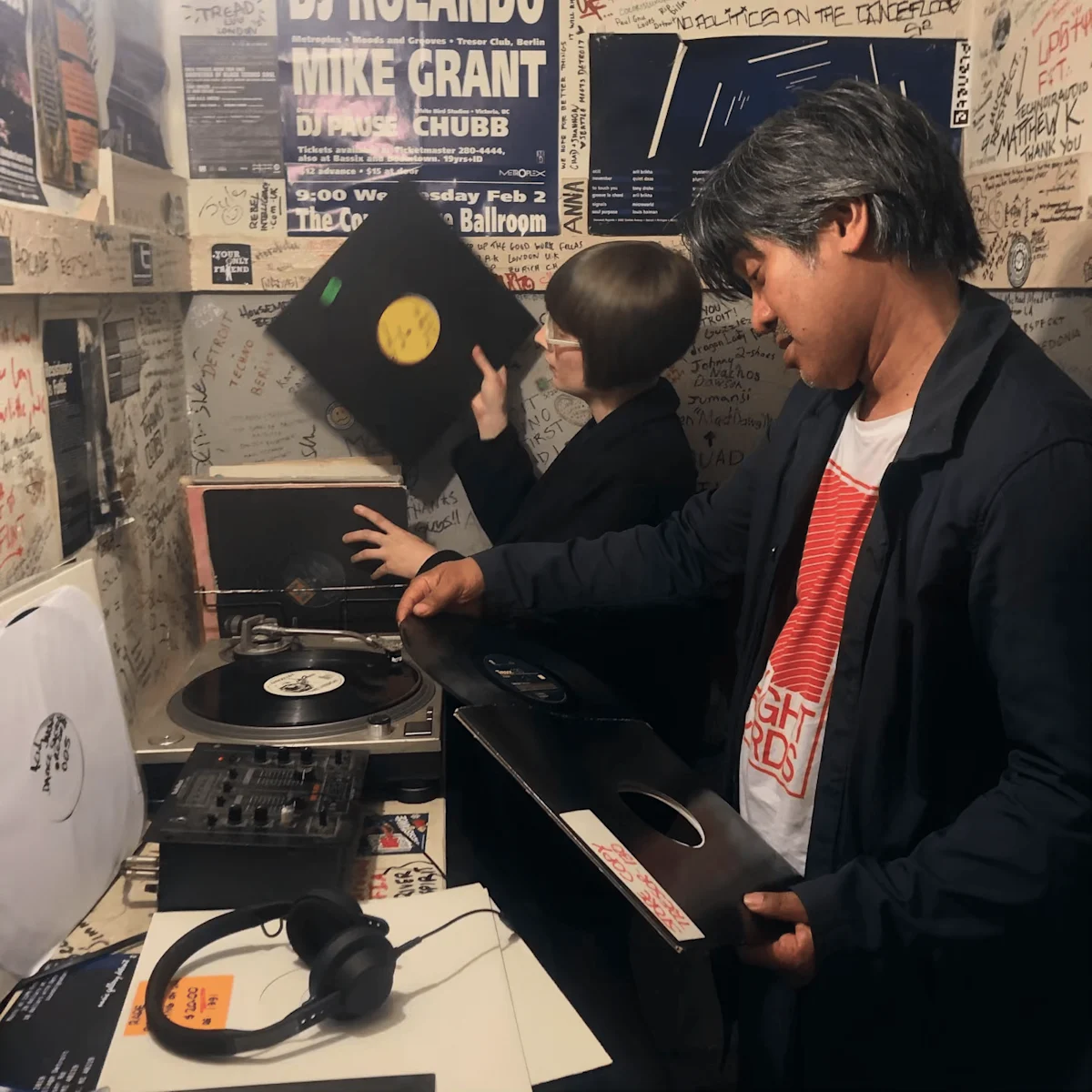
Coupling sound and image.
So, I worked in film for a bit, and worked in music for a bit. I’ve always been back and forth, but I guess music is the bigger one of the two for now. Those are my two passions. I spend most of my time watching movies or listening to music. But, Hamilton was a great scene. The only place you could go to hear great music was in a club, or if you bought the actual medium. It was a very subversive time, before the internet. It cultivated a very social aspect of music, or arts, because you would be forced to get together and discuss, or talk shit.
At this time you were collecting CDs, records, or tapes?
I’ve always been collecting media of some sort. We would record songs off the radio, because you couldn’t get them, or have access to the hard copy. You kind of melt with all these people who do the same sort of thing. The only people that I kept in contact with were the music or movie people, because there was always something to talk about. I’ve always been obsessed. It’s a bit of a disease and a blessing at the same time, you know, and I’ve been lucky enough to work in it and survive. It’s not an easy place to be.
Did the obsession start with listening, and then seeking out and collecting the media? What was the progression like?
One of the first things I heard was Blondie, you know, ‘Heart of Glass’, and I was like, “this is insane, what is happening?” I was going to school in my mom’s car, and I was really transported to another place. I would sing the song for days. So, I got obsessed with the structure of the song, what makes a good pop song, what makes a song cool – to me anyways. And then, the hoarding followed! [Laughs]
[Laughs]
So ya, records were always around. I had a paper route, and I would buy records, and there were all these old Italian guys who had these mixtapes, and they would give them to me, and be like, “this is Kraftwerk.” And I was like, “what the heck is Kraftwerk?” “Oh, it’s a robot band!” A robot band!? When you’re a little kid it feeds into your imagination in terms of possibilities of what you can do with music. When I was younger, we lived in-front of a drive-in, and our balcony faced the screen, so we could see free movies. My brother and I were both obsessed with movies and music. It was just luck of the draw in terms of exposure, but now I have way too many records!
Is there a quality of nostalgia for you when it comes to collecting and playing?
You always remember where you heard a song first and how it affected you. It changes how you play it, and what it means for other people. It’s funny when I buy a record, it’s more time-based. It’s not catalogued alphabetically or anything. I mean, I’m a hoarder and I have a zillion records, so I re-listen to things and some things sound better and some sound worse. It’s a good thing to have a record store, because you can always recycle it.
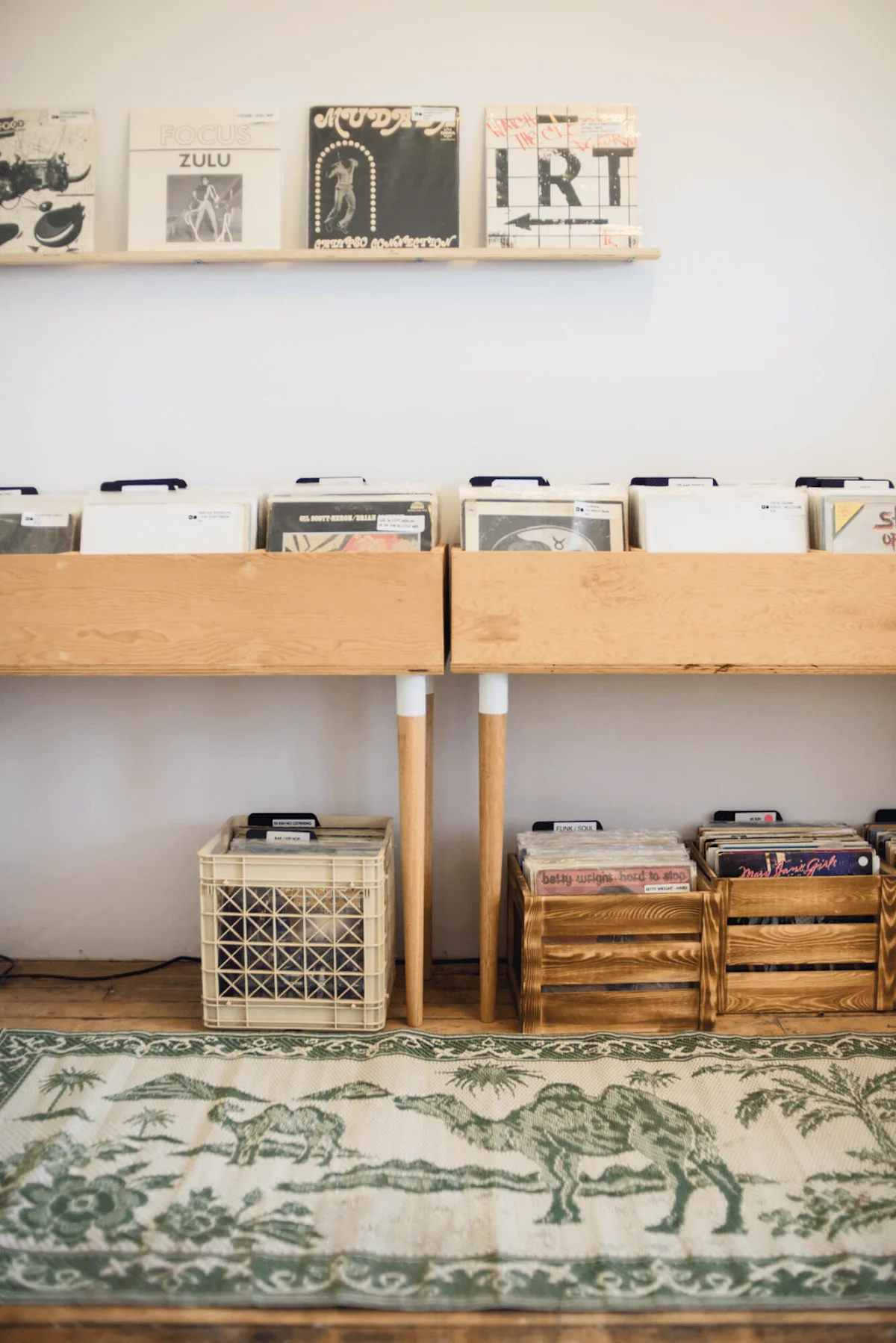
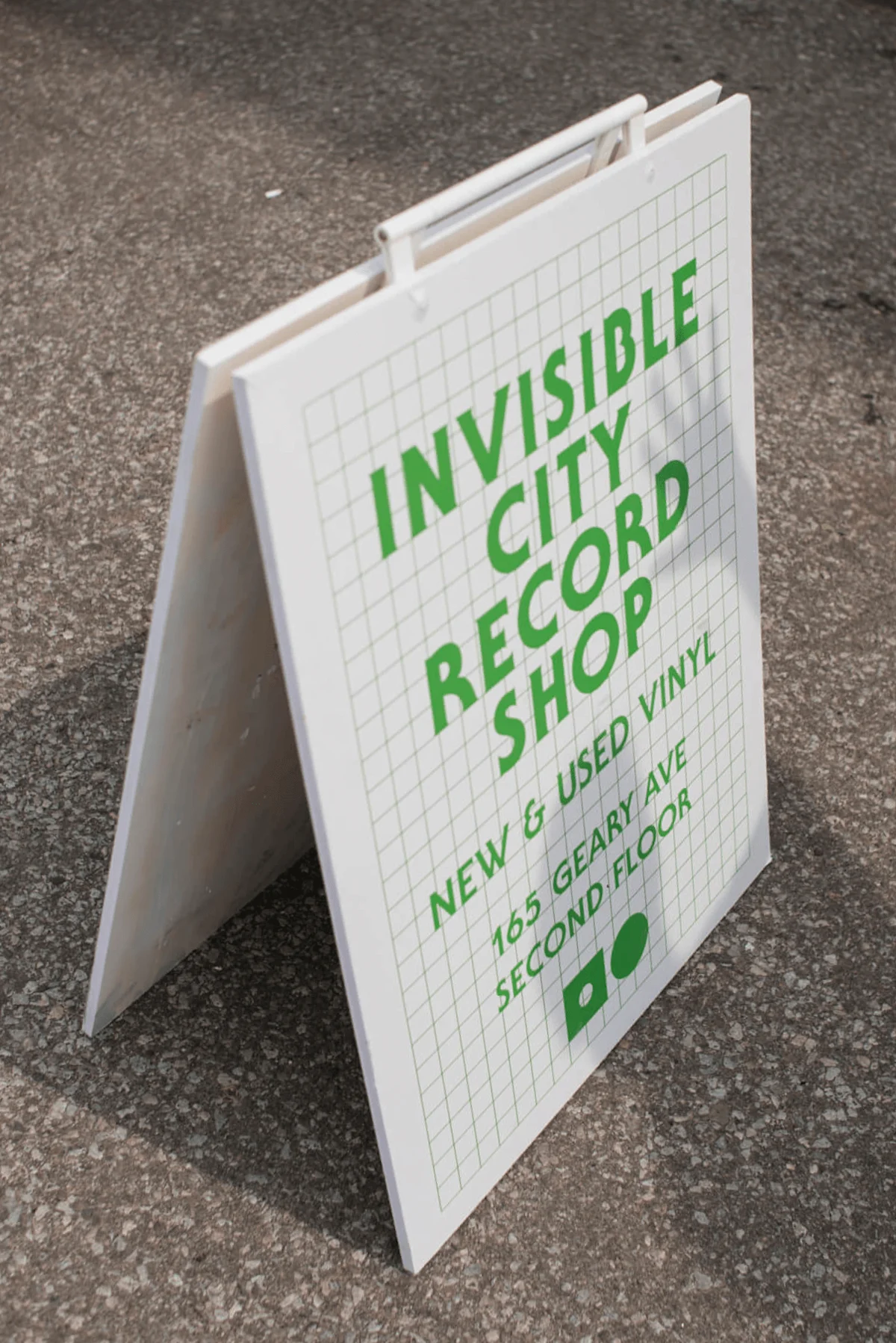
And your store is here in Toronto?
Ya, it’s in Chinatown. It’s been around for ten years now.
You also do pressings of records that are out of print?
We re-issue a lot of things we get obsessed with. A lot of it is out of print or unavailable. We’re exposed to a lot of music, and we just think this should get a bigger distribution, or this artist should have a renaissance, or new light. A lot of artists we approach are either into it, or they’re not, depending on where they’re at in their life. Most people are pretty receptive and open to it. We’ve been doing it for ten years, and have learned a lot about what works and what doesn’t as a label.
What’s something that doesn’t work?
It’s hard to say, but it depends on when and how you release it and what’s happening in the wheelhouse of people’s imaginations; what they need, or want to hear. Sometimes it clicks, and sometimes it just doesn’t work. Sometimes we press a lot of records, and they don’t sell, and then they start selling again because somebody put it in a playlist, or in a mix.
What is the thing that guides your own personal taste?
We just kinda go with our gut, and what we think works. Being a reissue label, it takes a long time to make the reproduction of something. By the time it finally comes out, you just hope it’s still interesting, and cool, or relevant. We just look for things that are crossovers. Something is one genre, but then also two different genres. It pricks your ear in terms of sound. We’ve only done, like, twenty releases so far. A lot of labels might be more productive or prolific, but when we release something we really focus on the artist and give them publicity in terms of their backstory, their biography, and how the record was made. But there’s a lot of reissue labels now, it’s crazy. It’s something that I thought would never catch on, but now everything from the past has been copied and regurgitated, or repackaged somehow. It’s problematic, but it’s also something that we do.
We live in a culture that has such a massive history, and records are out there that get lost or buried.
It’s definitely harder, as a reissue label, to find things to release, because of the internet. The spread of information is pretty wide these days. A lot of things are like, “oh this is reissued now?” It kind of devalues things for a lot of collectors. It’s kind of a strange time for reissuing. To find something that is unique and interesting is definitely challenging.
You mentioned that you look for records that straddle different genres, or are many genres mixed together, and I noticed this a lot in your Redux Mix. Is that something that you intentionally seek out?
If you’ve ever listened to the radio or listened to a DJ play a song, there’s a point where you’re like, “oh shit, what actually is this song?” You’re going to ask a barista, “What is this?” For me, that is what makes a song listenable or interesting. We try to do that with how we program or follow music. When you have to interrupt the DJ and ask what it is, that’s when you know you’re playing something that’s cool. When we DJ, sometimes people come up with Shazam, and it will just be a question mark. Usually, I’ll just say what it is.
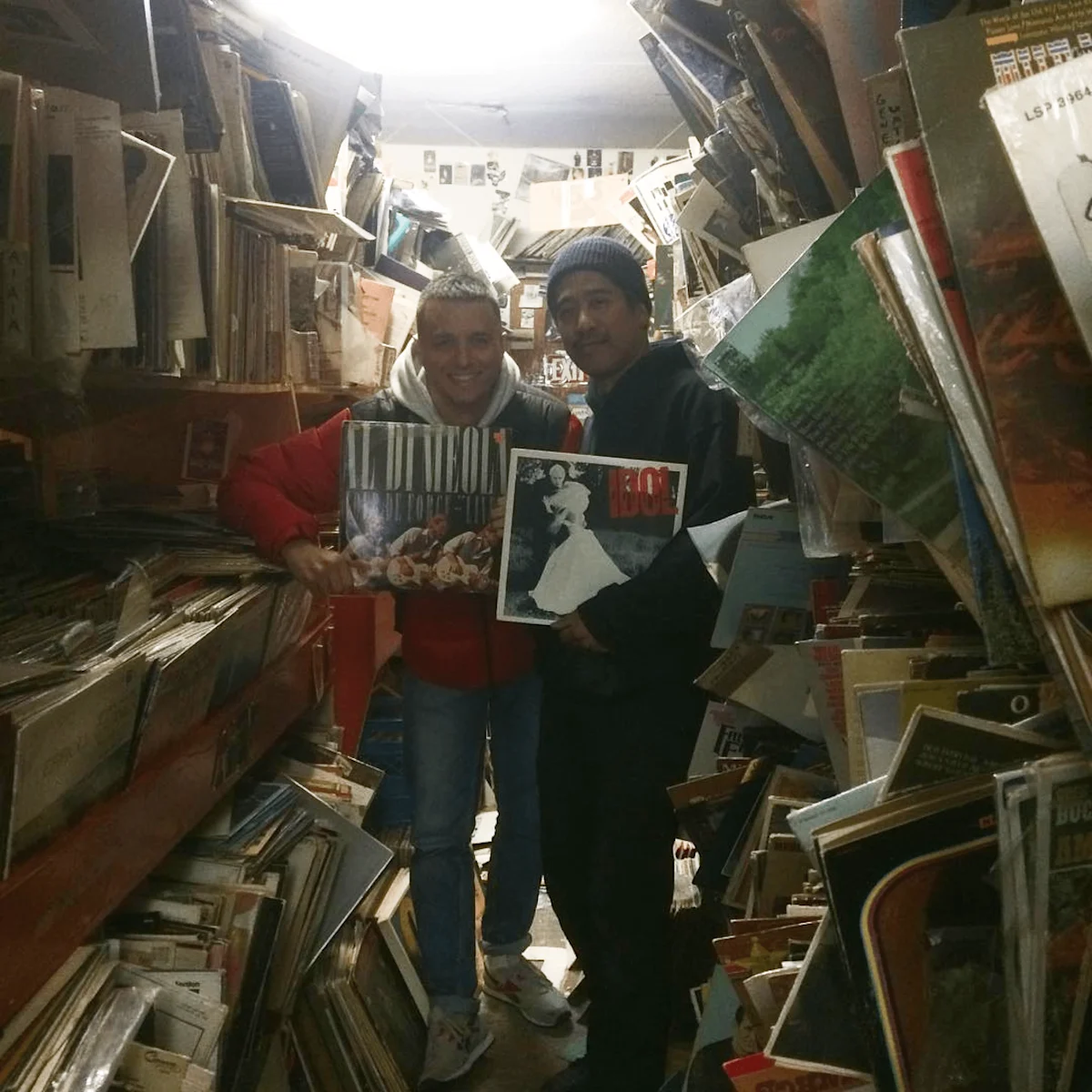
When I’ve talked with other DJs, they say DJing is not necessarily like a covetous trade or art.
It is and it isn’t. There’s some things you’re willing to share, and some you’re not. It’s like poker or something. Some people don’t want to share things because they’re developing it, or are doing something with it. For the most part, if you were to come up to me in a club and ask what the song is, I’ll show it to you, but it is very competitive. Knowledge is power, and people will use that.
It sounds like you’re really into music composition as well. Do you play instruments?
I can play the drums, but I haven’t played in a while. That’s pretty much it. I was taught drums, and played in bands as a kid, but that’s it. A lot of our friends are producers, and will tell me, “that sound is actually this instrument.” So, I am learning about what instruments make what sounds. That’s another world for me. Part of our business is just hearing something that is strange or out there.
Do you look for novelty in sounds?
What do you mean by novelty?
Like, something that sounds weird, unusual, or you can’t quite put your finger on what it is.
Sometimes there’s just one cool sound in a song, and you just like, “that’s incredible.” Like, some UFO landed on it, or some part of a song will veer off in another direction, like a part B or some perpendicular transition. We’re always like, “that sounds cool, how did you make that?” That can get in your ear, and you just want to hear that sound again.
The one that comes to mind actually is called ‘UFO’, by ESG.
Oh ya!
Whatever that first sound is, I don’t know! What is it?
It sounds like it could be a laundry line? I have no idea what’s happening there. There’s something about amateurishness in music, or maybe the opposite, the conceptual nature of it, that is just like, “wow, this is cool.” I think we really appreciate that left field, or different approach to music. But ya, I love ESG. I went to see them play in Detroit, and the bass player only had like one string! Everyone was like, “we love you!” She’s like, “I can only play one string. That’s all you get!”
[Laughs] It’s that vernacular aspect of music that is so endearing. I lose the feeling when the music is too progressive or virtuosic. We just need that one string! Every note matters.
Ya, it’s true. I’m not really into the gymnastics. You kind of just want a cool pop song. Something that is still accessible, but is out there or strange, like that clothing hanger sound. I don’t even know what that is!
I don’t know. [Makes the sound]
It could be an animal or something. Hopefully not. [Laughs]
[Laughs]
That’s what I mean. The first time you hear ESG; what is happening? There’s a bass, there’s a really dry drum, and just something insane, like a moody baby.
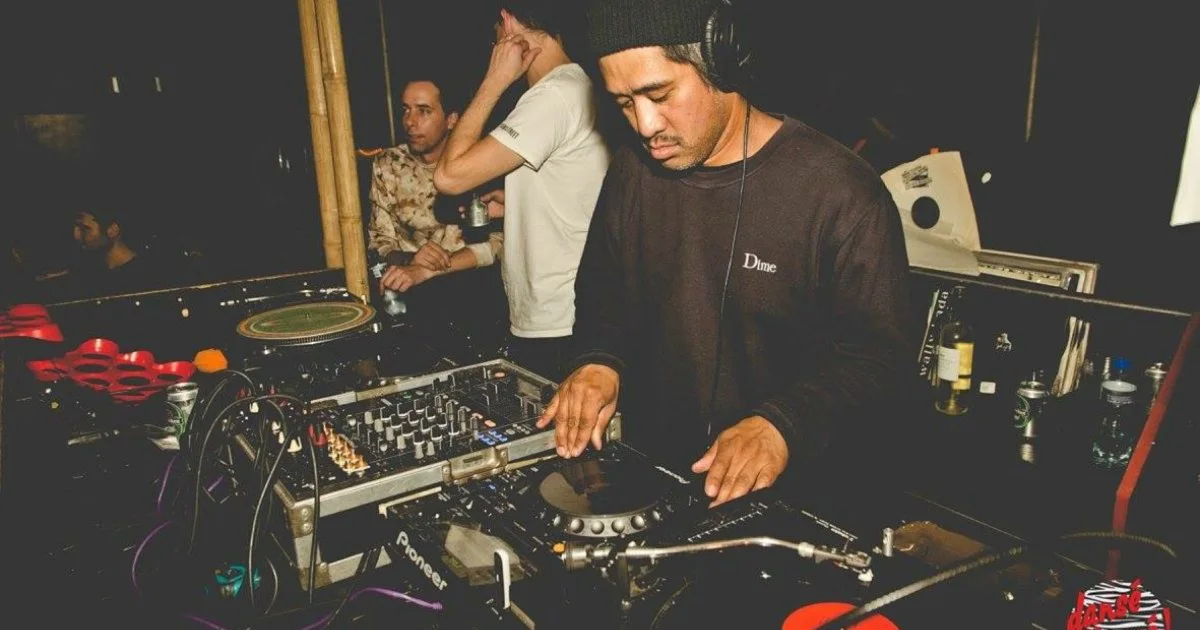
Do you have a personal catalogue of sounds that you identify with in your mind? Like, the Motown reverb, or the Detroit electronic sound?
Ya, for sure. You hear this microcommunity, and how people probably shared instruments and played them the same way. It’s really cool to see how everything shapes together, and then tropes, and flips around. The whole ESG New York New Wave scene was so sick. They had like no money, and they somehow managed to make something so iconic. They’re just like three sisters hammering it out. That’s maybe more the biographical aspect, but to see how something can materialize and sublimate what they were unconsciously or consciously feeling; I love that shit. And then the other thing is, when you hear that, you know there are another fifteen bands that sort of sound the same. Now I have to spend thousands of hours obsessing over it! I guess that’s what we try to do, explore something unknown. Our next release is this CD I found in New York that’s sort of Carribean island folk music, but synthesized. So, music from the 17th-century, but reimagined or modernized.
From the 80s, or 90s?
Ya, 1993. This deep history had an appeal to us. Kids love synthesizers and drum machines. It’s who we are right now, and what we want to hear, so this was just blowing my mind. The search goes on.
It never ends. I did want to ask, because you’re into film, are you a visual listener?
It’s interesting when you say that, because the hardest part for us is when we’re doing a cover. I definitely see certain colours, or images when I hear certain sounds. But to me, it’s harder for me to transcribe something visually.
Capturing the musical experience visually.
When I worked in movies, I only listened to music. Now that we only work in music, I’m back into film obsession. It kind of feeds each other. They are part and parcel. A lot of photographers are obsessed with music. Just like a lot of music people are obsessed with images. I do think they are connected somehow, but it’s hard to visualize. Like, the ESG cover is so cool.
I know, and it’s so that sound!
I know right. When you look at it, you’re like it’s kind of this blobby thing stuck together, and you’re like, “yup, that’s an ESG record!” That’s what makes a record great. Ninety percent of the appeal is on the shelf, when you’re drawn to it before even listening to it. The best records have that connection to the sound somehow, through design or art direction.
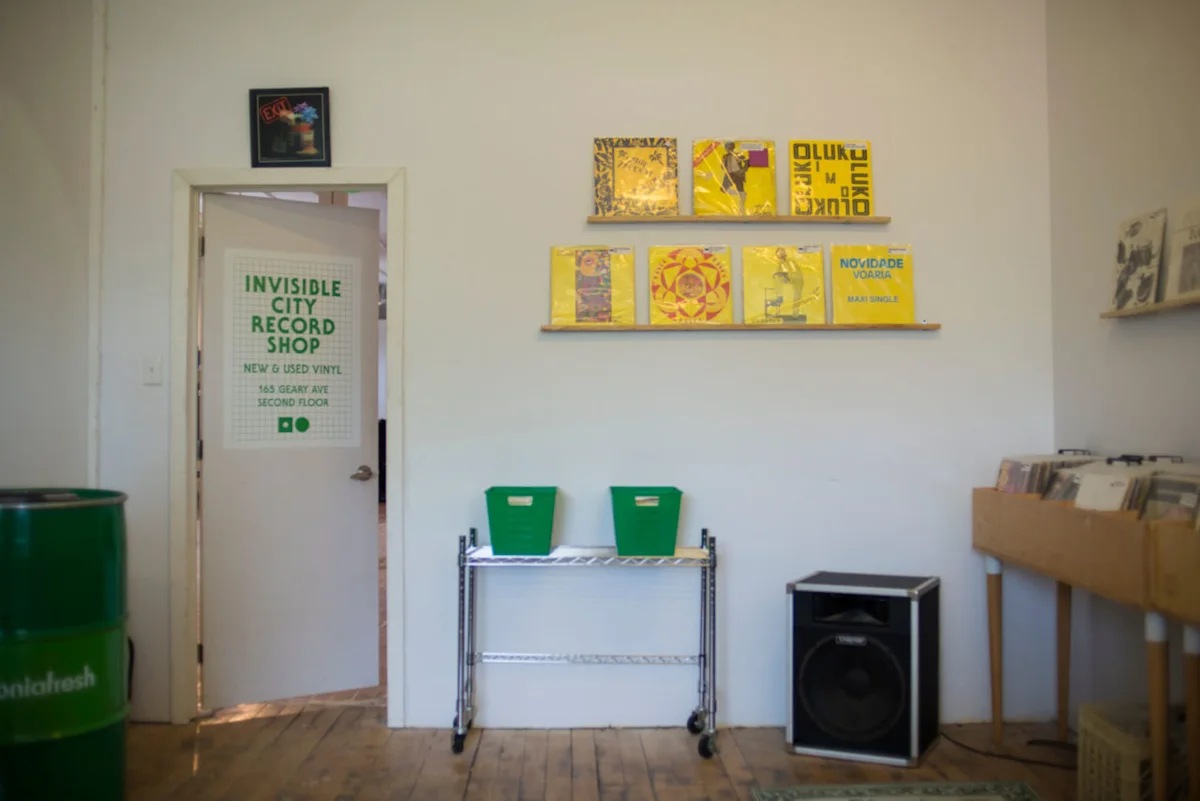
In terms of film, what are some of your favourite film cues?
Like when a song is synced in a movie?
Ya.
Interesting. I used to really enjoy when songs would play in films, now I’m kind of like, “you guys are just DJing in a movie.” You know what I mean? I watched a bit of Euphoria, and there were like twenty songs and the guy is just walking to get a coffee. It’s like, I know you guys are all psychotic and sexually deprived, but this is too much. But, in terms of film cues, sometimes it works and sometimes it really doesn’t. You know, we’re talking about ESG, and they’re in this movie that Nicholas Cage is in. Have you seen Vampire’s Kiss? They’re just like playing in the background. So, for me, I kind of just like when songs are diegetic, you know, they’re part of the environment. Someone’s listening to it, or it’s the stage band.
Have you seen Wings of Desire, when Nick Cave is playing on stage?
See, that’s cool! There’s times when non-diegetic music plays a part with how a movie is structured, like Chungking Express’s ‘California Dreamin’. Everytime it plays the character is going through memories, or trying to recreate or replenish something. For the most part, I like how songs are in the background, or part of the scene, but other times you watch something like Mandy and it’s just so immersive. I just feel like I’m in a heavy metal video game or something. Sometimes the artifice of how a song comes in can really affect how you hear a song in a movie.
I know what you mean about Euphoria. They don’t even play the full song!
Right? It’s like ten seconds of the song. And I get it, they’re ADHD or they’re high and crazy, that’s their world, but it’s a love-hate relationship with how music is played in films. We had one of our songs in an Aziz Ansari movie, it’s an uptempo disco song, and this couple is just on an awkward date in a restaurant. It’s like, “What’s going on?” I get it, it’s an awkward date, and they’re listening to this music. I don’t know if they were trying to do that on purpose. I don’t know if music supervision sometimes is about bragging about musical knowledge, or if they actually need it as part of the film.
–
Work Redux is a collection of mixes made to be listened to while working. We work closely with local and international DJs to assemble thoughtful music that will carry members throughout their day and introduce them to new sounds. East Room is a shared workspace company providing design-forward office solutions, authentic programming and a diverse community to established companies and enterprising freelancers. We explore art, design, music, and entrepreneurship, visit our news & stories page to read more.